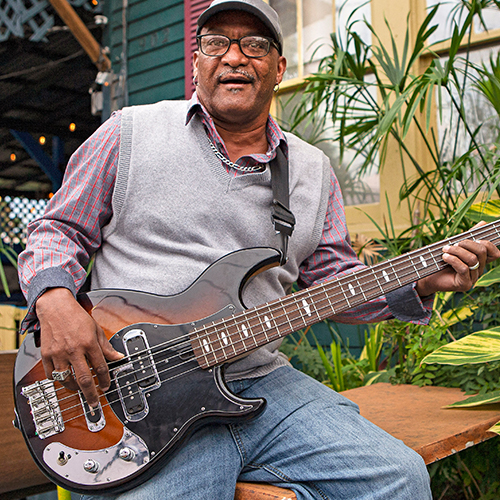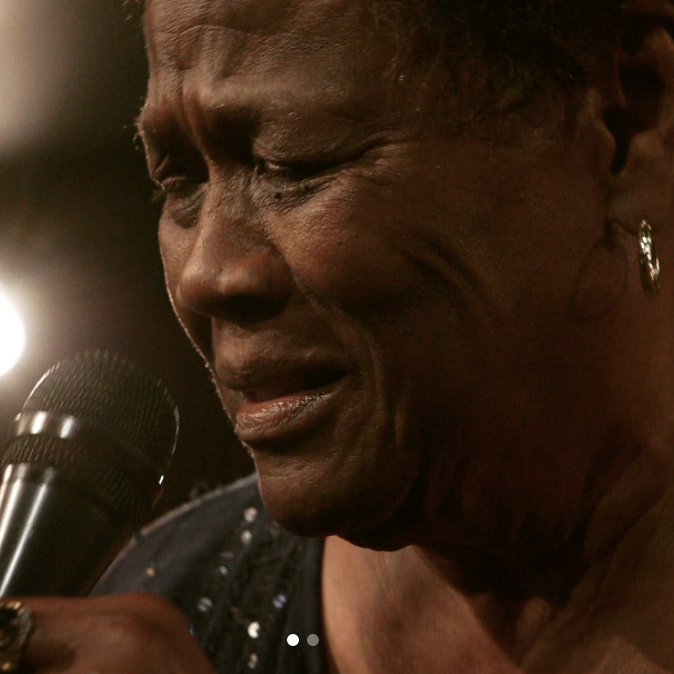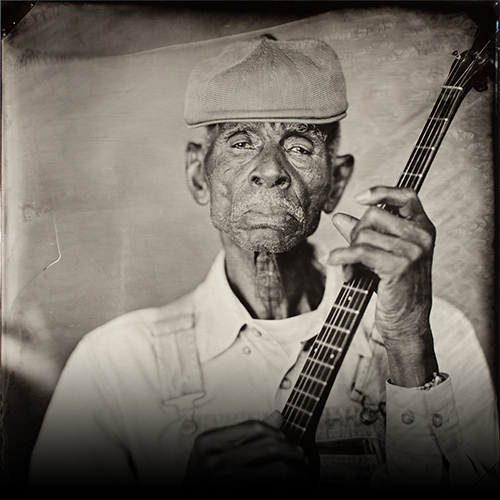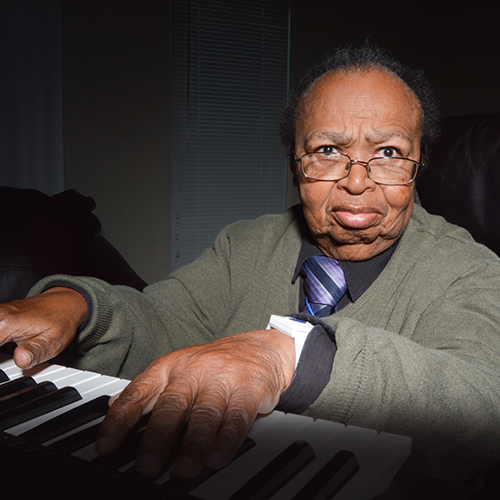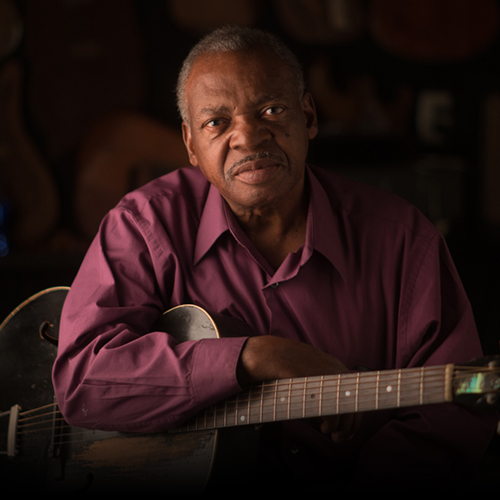Biography
One of Music Maker’s most renowned and respected artists, John Dee Holeman spent the first six years of his life in Hillsborough, N.C., barely a mile from where Music Maker is now based.
How We Helped:
Music Maker has released four albums, booked countless performances, and provided emergency assistance when Mr. Holeman needed to relocate.
“I was born in 1929,” he says in his lilting, soft-spoken manner. “My father was Willy Holeman, and my mother was born Annie Obie near Roxboro, N.C. Her daddy moved to Hillsborough and ran a flour mill. James Obie was my uncle; there are still Obies in Hillsborough. I lived on the Sam Latta place at first – he was the High Sheriff. There were three sisters and one brother. My parents are planted in the cemetery of Obie’s Chapel Church in Person County.
“In about 1935, we moved to a 100-acre farm on Gray Road in northern Orange County,” Holeman continues. “We would walk four miles to the store at Timberlake to get us some candy. We could play on Saturday or Sunday, you know, fix a swing in a tree, swing in a tire and things like that. One time I took a fender off a Model T Ford, got on a bank, put water on the bank, and slid right down to the bottom! I completed the fourth grade, then stopped; we weren’t compelled to attend then. I cut short my education because Daddy needed me to farm. I had to do what my Daddy said. I missed my education, but I’ve made a living so far.”
The gracious, gentlemanly artist has made a living and then some. He has performed at the National Folk Festival, at Carnegie Hall, and has made overseas tours. In 1988, he was awarded a National Heritage Fellowship from the National Endowment for the Arts, still proud of the certificate signed and given to him by then-President Ronald Reagan. His skill as a guitarist, singer and buck dancer have carried him far beyond his small-town and country roots.
It was his skill as a guitarist that first set him apart.
When he was 14, he bought a new Sears Silvertone guitar for $15. “I thought I had something!” he says. His uncle and cousin taught him a few chords. “I listened to 78s like ‘Step It Up and Go’ by Blind Boy Fuller, the Grand Ole Opry, and heard others play at pig-picking parties. I was good for catching on. My guitar kept me company when I tended to tobacco in the barn so I wouldn’t go to sleep. You had to control the tobacco as it cured – you ran one heat to get the green out, then another to dry it out for cigarettes.”
With the farm struggling, he moved to Durham in 1954. “The government took over the farming and gave you an allotment of how much you could raise,” Holeman recalls. “Before that we raised as much as we could handle. If you went over the allotment at harvest time, they’d make you cut it down. In 1954, I got $200 for my portion of tobacco for the whole year. I went to the Liggett and Myers Tobacco Company for work. You could get a three-room ‘shotgun’ house for $6 a week. I also operated heavy equipment, like hauling dirt.”
In Durham, he got to play with musicians who had learned first-hand from such bluesmen as Brownie McGhee, Sonny Terry and Reverend Gary Davis. In recent years, he has been a regular at Durham’s summer Warehouse Blues Concert Series at the site of the old L&M factories and warehouses where he once worked.
Although Holeman played his guitar at private functions while keeping his day jobs, it wasn’t until folklorist Glen Hinson asked him to play at the Bicentennial Festival in Durham that his music career took off, though at first he wasn’t sure he was up to it. “He said there would be 500 or 5,000 people,” he says. “I told him, ‘I can’t face that many people. I’m not that good.’ He said to do the same thing that I do at my house or at a pig-picking, to do what I know. He just about begged me. I went out there, and everybody like to have a good time. It made me feel real good.”
Since then, he has been “just about all over – Thailand, Honolulu, Hong Kong, Indonesia, Singapore, Turkey, Canada and six weeks in Africa. I met B.B. King and Chuck Berry and played with Joe and Odell Thompson (from Mebane, N.C.) in Boston.” He also met Lighnin’ Hopkins, who originally recorded a song in Holeman’s repertoire, “Give Me Back My Wig (Let Your Doggone Head Go Bald).” Some of his overseas trips were sponsored by the U.S. State Department. In addition to caring for his late wife, Janet, when she became ill for several years, he managed to keep a regular schedule of foreign and local gigs with partners such as harp player Billy Stevens and the late piano player Fris Holloway. More recently, he has recorded on the Music Maker label, backed by such artists as Taj Mahal and Cool John Ferguson. In 2008, Zeke Hutchins produced Holeman’s most recent CD, “You Got To Lose, You Can’t Win All The Time.”
When Holeman turned 80 in 2009, his many friends surprised him with a new electric guitar, which made his Piedmont blues sound as fresh as ever. Fellow MM artist Harvey Arnold, who has played bass and guitar with him, described the ease of Holeman’s style and sound.
“His playing and singing have that special feel like they’re pouring out as natural as breathing,” Arnold says. “He’s such a genuine bluesman that I want to touch him and hope it rubs off on me.”
– Peter Kramer
